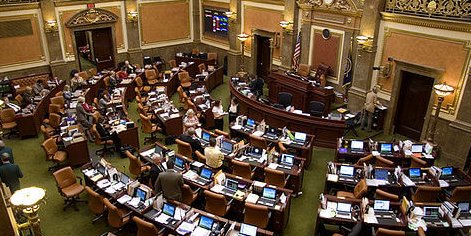This article originally appeared in The Salt Lake Tribune. Read it in its entirety here.
Utah legislators want to change the state Constitution so that they can call themselves into special session whenever they like. The only thing standing in the way of this power grab is Utah voters who, on Nov. 6, will vote on Constitutional Amendment C. The ballot will be crowded, but voters should be very wary indeed of this Trojan Horse.
Legislators would like voters to understand that this sweeping power would only be used in the event of war, natural disaster, “fiscal crisis,” or “an emergency in the affairs of state.” What is a “fiscal crisis” or “an emergency in the affairs of state”? Make no mistake: it’s whatever the Legislature wants it to be – and no one can second-guess that, not even a court.
It’s not as though no one else with power to call a special session isn’t minding the store. The governor, “on extraordinary occasions” may by proclamation convene the Legislature into a special session, and these are not rare occurrences.
And what, pray tell, birthed this power play? Ah – thereby hangs a tale.
No kidding, it was legislative pique over how Rep. Jason Chaffetz’s replacement would be selected – truly “an emergency in the affairs of state.” At its core, it was the demand of legislators who wanted Chaffetz’s replacement to be named by the Republican Party delegates in an end run around SB 54’s dual-path signature route to a primary election.
Gov. Gary Herbert did not want to see state law subverted by allowing a handful of party delegates to saddle the state with a congressman picked by such a small fraction of Republican voters. If Amendment C had been on the books a year ago, you can be certain that this grave “emergency in the affairs of state” would have produced a special session to subvert the SB 54 dual-path nomination process.
Legislators already have the constitutional power to call themselves into a veto-override session, and the Republicans, for decades, have garnered veto-proof majorities in both houses. Fair enough. They really do not need to further undermine the delicate balance of checks on one “co-equal” branch of government having altogether too much power over the other two. Out of one side of their mouths, too many legislators posture as fervent constitutionalists, yet out of the other, they don’t care much at all for the checks and balances that keep governmental power diffused and fenced, to best ensure liberty.
In The Federalist No. 48, James Madison wrote, “The legislative department is everywhere extending the sphere of its activity, and drawing all power into its impetuous vortex. … Its constitutional powers being at once more extensive, and less susceptible of precise limits, it can, with greater facility, mask, under complicated and indirect measures, the encroachments which it makes on the coordinate departments.”
In No. 51, Madison (or Alexander Hamilton) wrote, “The provision for defence [against gradual concentration on powers in the same department] must… be made commensurate to the danger of attack. Ambition must be made to counteract ambition. If men were angels, no government would be necessary. If angels were to govern men, neither external nor internal controls on government would be necessary. In framing a government which is to be administered by men over men, the great difficulty lies in this: you must first enable the government to control the governed; and in the next place oblige it to control itself.”
Amendment C, in a one-party state, ruled by that party’s veto-proof legislative majorities, many of whose members want to insulate themselves from the will of the people by limiting candidate nomination power to fewer than 1 percent of the voters, will wreak constitutional mischief by significantly diminishing the power of the governor as a check on legislative overreach.
Serving in the state Legislature is a heady experience. It’s easy to begin to assume that voters don’t really understand what’s good for them – that having won an election automatically confers a truer sense of what’s good for the rest of us than we have ourselves. Call it hubris, call it ego, even call it arrogance: the signers of this commentary fully understand and appreciate how the power virus takes control. We all had it – some more or less than others.
But upon leaving the office, and the pumpkin that’s the Capitol (and the mice for carriage horses) we got over it. Make no mistake, Amendment C is not a glass slipper. And it did not spring forth, fully formed, from the head of Humility. We’re voting no, and we urge you to join us.
This article originally appeared in The Salt Lake Tribune. Read it in its entirety here.

